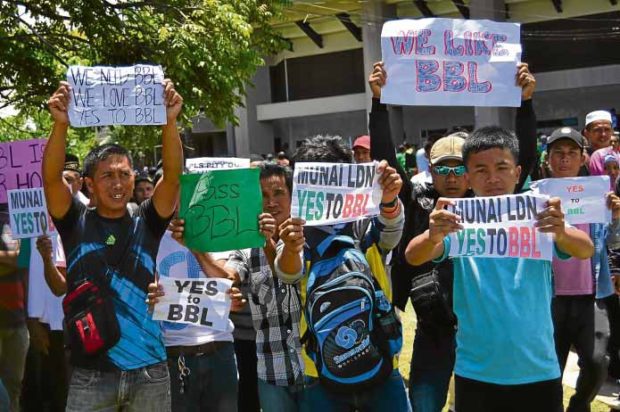
LANAO CONSULTATION Lanao del Norte residents express support for the passage of the
proposed Bangsamoro Basic Law during a consultation meeting held atMindanao Civic Center in
Tubod, Lanao del Norte, on March 15. —JIGGER J. JERUSALEM
The Senate is confident that the proposed Bangsamoro Basic Law (BBL) it has just passed complies with the Constitution, but that is exactly why not everyone in Muslim Mindanao is rejoicing.
It is with the House of Representatives’ version of the proposed charter for an autonomous Muslim homeland in Mindanao that they are disappointed, and the grumbling is ominous.
Voting 21-0, the Senate approved the proposed BBL at 1 a.m. on Thursday, just in time as the 17th Congress adjourned its second regular session. It will return for the third regular session on July 23.
The House, voting 226-11 with two abstentions, passed its version at 5 p.m. on Wednesday, but the bill was not the work of the Bangsamoro Transition Commission (BTC) that helped the government lay the plan for a new autonomous region for Muslims in Mindanao.
The newly passed BBL “does not inspire hope in our hearts that we of the Bangsamoro will receive justice to set right all the injustices committed against our people,” the Suara Bangsamoro group of Muslim activists said in a statement issued in Cagayan de Oro City on Thursday.
No Bangsamoro control
“This milquetoast that they’re passing off as BBL leave the Bangsamoro with no control over the resources of the area they define as our autonomous areas,” said Jerome Succor Aba, the group’s national chair.
“Just like in the ARMM (Autonomous Region in Muslim Mindanao), this BBL appoints the new Bangsamoro political entity to facilitate the wholesale selling of our territories and natural resources to foreign corporations under the guise of bringing growth and development to Bangsamoro areas,” Aba said.
Anakpawis Rep. Ariel Casilao said the belief that the House version of the proposed BBL did not represent the aspiration of the Moro people was the reason he voted against the measure.
“The approved law was very different from what I believe autonomy and self-determination should be,” Casilao said in a statement on Thursday.
Bayan Muna Rep. Carlos Isagani Zarate said the original proposal was the product of negotiations among the government, the Moro Islamic Liberation Front (MILF) and the Moro National Liberation Front, but it was watered down.
“The substituted HB 6475 (House Bill No. 6475) set aside all of these efforts,” Zarate said.
Malacañang pleased
But Malacañang said on Thursday it was pleased with the passage of the Senate and House versions of the bill that President Duterte had earlier certified.
“We are hoping that you know congressmen (and senators) will also exert efforts to make sure this BBL will withstand judicial scrutiny, having learned already from the lessons of the earlier MOA-AD (memorandum of agreement on ancestral domain),” presidential spokesperson Harry Roque said, referring to the proposed agreement on ancestral domain that the administration of President Gloria Macapagal-Arroyo negotiated with the MILF in 2008 but that the Supreme Court struck down as unconstitutional.
Senate Majority Leader Juan Miguel Zubiri, who sponsored the measure and led the debates in the Senate, expressed confidence that the chamber’s version was “compliant with the Constitution and [could] withstand scrutiny by the Supreme Court.”
Zubiri said the Senate was able to “weed out” provisions that “earlier muddled our intentions to improve the lot of fellow Filipinos in Muslim Mindanao.”
He said the Senate version “gives great latitude to the Bangsamoro people ‘to assert their political and economic self-determination, and pursue development programs for their people according to their peculiar historical, cultural, religious and national identities.”
Sen. Aquilino Pimentel III told reporters that the BTC may not have gotten 100 percent of what it wanted but the Senate version fixed its proposal and made it compliant with the Constitution.
Important concepts
“All the important concepts [proposed by the BTC] are there—block grant, special development fund, taxing power and parliamentary structure,” Pimentel said.
Told that Speaker Pantaleon Alvarez had concerns on the constitutionality of making a law that would make an autonomous Bangsamoro region happen, Pimentel said Congress was actually “building upon the gains of the ARMM” and enhancing its autonomy.
“We will survive the test of constitutionality because this is still the autonomous region mentioned in the Constitution,” he said.
But Fatima Pir Allian of the Moro group, Nisa Ul Haqq Fi, said the passage of the House and Senate versions of the proposed BBL was not a cause for celebration.
The House bill that passed, she said on Facebook, was not compliant with the Comprehensive Agreement on the Bangsamoro, the final peace agreement signed by the government and the MILF in 2014, stilling the guns in Mindanao.
The agreement provided for the establishment of an autonomous Bangsamoro region that would replace the ARMM and for the decommissioning of the MILF’s fighting force.
“It has changed in form and substance,” Allian said.
Dilution of proposal
Sultan Maguid Maruhom, director of Ummah Fi Salam, said he was worried the dilution of the original proposal could affect the acceptability of the proposed BBL to the Bangsamoro, but he hoped the Senate-House conference could fix the flaws.
ARMM Gov. Mujib Hataman and Maguindanao Gov. Ismael Mangudadatu said they appreciated the work of the 17th Congress.
But Mangudadatu, whose province is the home base of the MILF, said that he hoped the final version would be parallel to the original work of the two sides. — WITH REPORTS FROM ALLAN NAWAL, JIGGER JERUSALEM, JULIE ALIPALA, LEAH AGONOY AND EDWIN FERNANDEZ